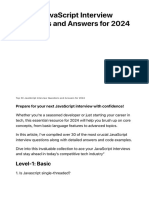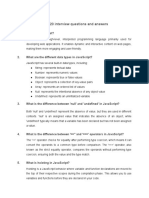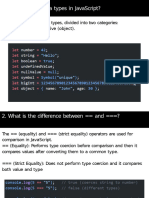JavaScript_Interview_Questions_2025
Uploaded by
utkarshlofimusicJavaScript_Interview_Questions_2025
Uploaded by
utkarshlofimusicTop 25 JavaScript Interview Questions (2025)
1. What are JavaScript ES6+ features that are widely used in modern development?
Modern startups leverage ES6+ features for better code readability and performance.
- Arrow Functions: `const add = (a, b) => a + b;`
- Template Literals: `Hello, ${name}!`
- Destructuring Assignment: `const { name, age } = user;`
- Spread & Rest Operator: `const newArray = [...oldArray, newItem];`
- Async/Await: `const data = await fetchData();`
- Optional Chaining: `user?.profile?.email`
- Nullish Coalescing Operator (`??`): `const val = input ?? 'default';`
2. What is the difference between `let`, `const`, and `var`?
| Feature | `var` | `let` | `const` |
|----------|------|------|------|
| Scope | Function-scoped | Block-scoped | Block-scoped |
| Hoisting | Hoisted with `undefined` | Hoisted without initialization | Hoisted without initialization |
| Reassignment | Allowed | Allowed | Not allowed |
| Redeclaration | Allowed | Not Allowed | Not Allowed |
Best Practice: Use `const` whenever possible, and `let` when reassignment is needed.
3. Explain event delegation and why it is useful.
Event Delegation is a technique where a parent element handles events for its child elements by using event
bubbling.
**Example:** Instead of adding event listeners to multiple buttons:
```js
document.getElementById('parent').addEventListener('click', function(event) {
if (event.target.matches('.child-button')) {
console.log('Button Clicked!');
}
});
```
**Why useful?**
- Improves performance
- Reduces memory usage
- Simplifies dynamically added elements
4. What are Promises and how do they differ from Callbacks?
A **Promise** is an object representing the eventual completion of an asynchronous operation.
**Example:**
```js
const fetchData = () => {
return new Promise((resolve, reject) => {
setTimeout(() => resolve('Data Fetched!'), 2000);
});
};
fetchData().then(console.log).catch(console.error);
```
| Feature | Callbacks | Promises |
|---------|----------|----------|
| Syntax | Nested (callback hell) | Chainable `.then()` |
| Error Handling | Hard to manage | Easier with `.catch()` |
| Readability | Complex & messy | Clean & structured |
5. What are async/await, and how do they simplify Promises?
Async/Await is syntactic sugar over Promises for better readability and error handling.
**Example:**
```js
async function fetchData() {
try {
const response = await fetch('https://api.example.com');
const data = await response.json();
console.log(data);
} catch (error) {
console.error(error);
}
}
fetchData();
```
**Why use async/await?**
- Avoids `.then()` nesting
- Reads like synchronous code
- Better error handling with `try/catch`
You might also like
- JavaScript_Interview_Questions_2025_DetailedNo ratings yetJavaScript_Interview_Questions_2025_Detailed2 pages
- Top 30 JavaScript Interview Questions and Answers For 2024 - by Ravi Sharma - MediumNo ratings yetTop 30 JavaScript Interview Questions and Answers For 2024 - by Ravi Sharma - Medium45 pages
- Important questions asked in Js interviewsNo ratings yetImportant questions asked in Js interviews10 pages
- Advanced Tutorial About JavaScript ProgramNo ratings yetAdvanced Tutorial About JavaScript Program3 pages
- "Top 25 JavaScript Interview Questions and Answers For 5 Years of Experience (ES6 and Above) - MediumNo ratings yet"Top 25 JavaScript Interview Questions and Answers For 5 Years of Experience (ES6 and Above) - Medium18 pages
- 50 Javascript Interview Questions Part 1No ratings yet50 Javascript Interview Questions Part 155 pages
- JavaScript Interview Questions With AnswersNo ratings yetJavaScript Interview Questions With Answers18 pages
- 1.why Is It Called A Ternary Expression, What Does The Word "Ternary" Indicate?No ratings yet1.why Is It Called A Ternary Expression, What Does The Word "Ternary" Indicate?7 pages
- Top 100 JavaScript Interview Questions and AnswersNo ratings yetTop 100 JavaScript Interview Questions and Answers29 pages
- Promise Vs Callback Vs Async - Await - by Mohit Garg - Dev GeniusNo ratings yetPromise Vs Callback Vs Async - Await - by Mohit Garg - Dev Genius6 pages
- Python Advanced Programming: The Guide to Learn Python Programming. Reference with Exercises and Samples About Dynamical Programming, Multithreading, Multiprocessing, Debugging, Testing and MoreFrom EverandPython Advanced Programming: The Guide to Learn Python Programming. Reference with Exercises and Samples About Dynamical Programming, Multithreading, Multiprocessing, Debugging, Testing and MoreNo ratings yet
- E-Commerce Describes The Process of Buying, Selling, Transferring, or Exchanging Products, Services, And/orNo ratings yetE-Commerce Describes The Process of Buying, Selling, Transferring, or Exchanging Products, Services, And/or7 pages
- Experiment Formation of Z-Bus Matrix AIM: To Perform The Formation of Z-Bus ApparatusNo ratings yetExperiment Formation of Z-Bus Matrix AIM: To Perform The Formation of Z-Bus Apparatus2 pages
- Adding Intel SATA Drivers To An Installation CDNo ratings yetAdding Intel SATA Drivers To An Installation CD1 page
- IA 124: Introduction To IT Security: Malware & Intrusion DetectionNo ratings yetIA 124: Introduction To IT Security: Malware & Intrusion Detection27 pages
- Teachers Voices From Argentine ClassroomsNo ratings yetTeachers Voices From Argentine Classrooms69 pages
- Multichiller - Bacnet - Modbus - Mapping - MC - EvoNo ratings yetMultichiller - Bacnet - Modbus - Mapping - MC - Evo23 pages
- Information System For Managers Practical Aspect On FlipkartNo ratings yetInformation System For Managers Practical Aspect On Flipkart23 pages
- Solve Any Data Analysis Problem MEAP V02 David Asboth All Chapters Instant Download100% (3)Solve Any Data Analysis Problem MEAP V02 David Asboth All Chapters Instant Download79 pages
- Modbus RTU Communication Protocol Between ELCNo ratings yetModbus RTU Communication Protocol Between ELC7 pages






























































































